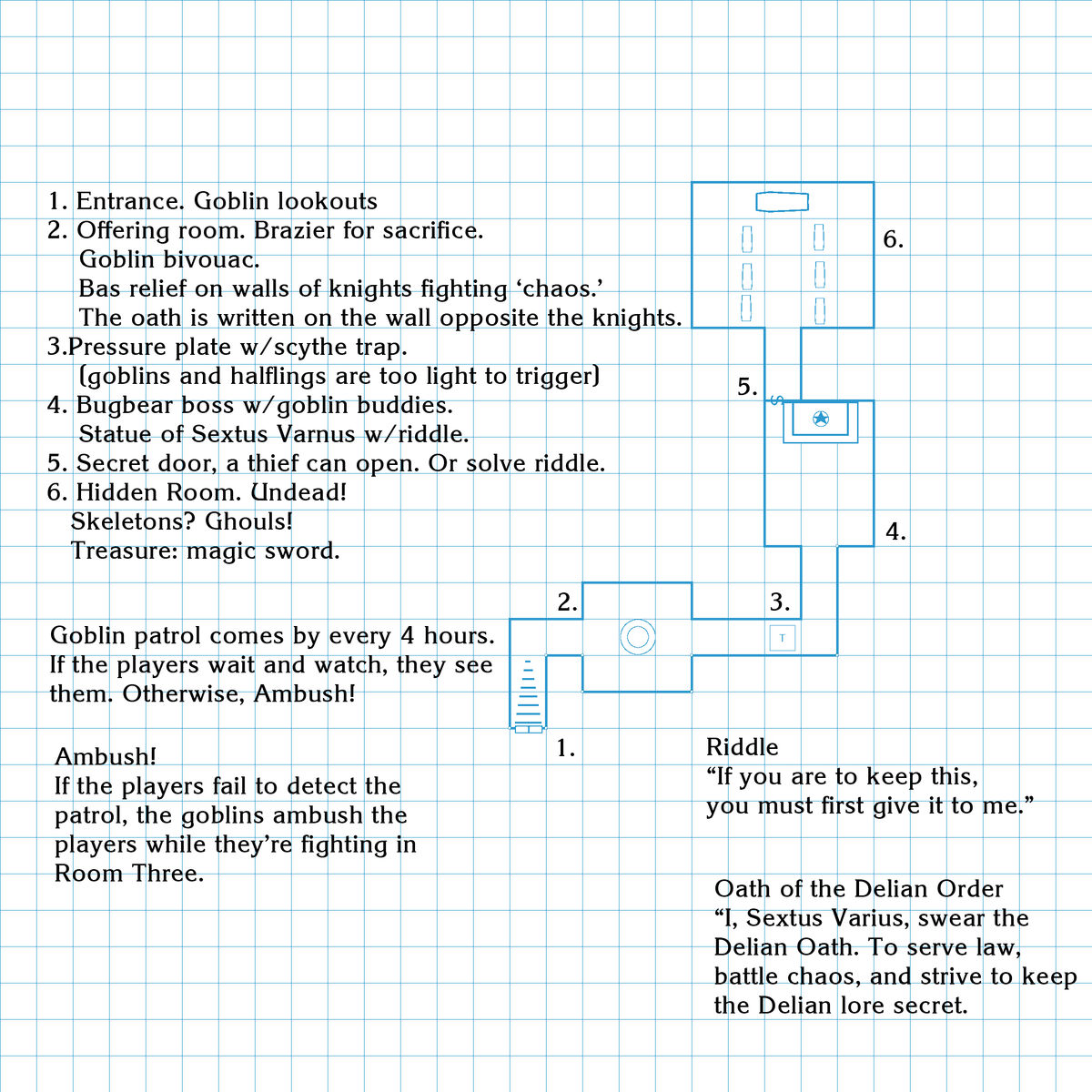mamba
Legend
as promised (threatened?) here are some questions about this, still trying to nail down your roleI've posted actual play examples from 4e D&D, from Burning Wheel, from Torchbearer and from Classic Traveller. I can provide more if you like
As a basis I am using the Delian Tomb, cannot really think of a more basic adventure, but it should be sufficient for this. Maybe some people are somewhat familiar with it already, if not, here is a link

The Delian Tomb
The Delian Tomb is a low-level dungeon designed by Matt Colville using Dungeonographer in the first episode of his Running the Game series on Youtube. The dungeon is meant to serve as a simple ready-made adventure for a new dungeon master to run for new players on short notice, containing 5...
You can basically get everything you need for this discussion from just the picture
I am not basing this on any edition of D&D, I am more looking for Burning Wheel, Torchbearer or ones like that. I am not familiar with them, but they sound a lot more rules-heavy and procedural than D&D (which might lead to a whole other discussion about agency, but I am not sure I want to have that
Ok, here goes:
Who is coming up with the premise? I assume the players do, i.e. players decide 'we want to look for treasure in an old tomb and fight some goblins', or is any of that part not based on player input? E.g. do you pick the monsters?
What if these are new players and instead they say 'we want to look for treasure in an old castle ruin and fight a dragon'? Are you thinking 'fine, if that is what they want, we figure out the rest along the way', or do you point out immediately that fighting a dragon is maybe not the best idea for a 1st level party?
Is it much less direct than that? The players just say something about looking for treasure and the rest is up to the GM / some random tables?
Let's say the players made it close to the entrance, there are some goblin guards hiding in the bushes near the entrance. How did they get there? Did the GM decide to place them there because that is a reasonable thing to do? Are there some rules for generating random dungeons that would have had to result in this? Is that something the players must have hinted at for them to be there? Can the players ever be surprised by some goblins jumping out of the bushes? Not if they are the ones responsible for placing them there.. at least not the players, their chars still might, according to the rules.
For that matter, who decided the layout of the tomb? Some random dungeon generator in the rulebook, the GM based on descriptions the players gave (i.e. doing their best to incorporate everything the players said their chars have heard, but some stuff original to the GM), the GM based on their own ideas?
This to me becomes relevant when it comes to things like traps and secret doors, these cannot really be placed by the players, do they have to at least mention them at some point?
Finally, a fight, how was it decided who the enemies are, how many there are, etc. Again the random dungeon generator tables, the GM based on player input, the GM based on their own ideas?
I assume the actual actions taken by the enemies are up to the GM at least...
Treasure seems straightforward, a combination of 'the player wished it here' and items from a random table. We covered that part previously.
This leaves out social interactions, I assume those are mostly persuasion rolls against some DC or the equivalent of that, i.e. the players obviously cannot decide whether the other side agrees and to what, and it does not sound like the GM has much of a say in that either (short of deciding the NPC was convinced by the arguments and no roll is needed)
Last edited:


